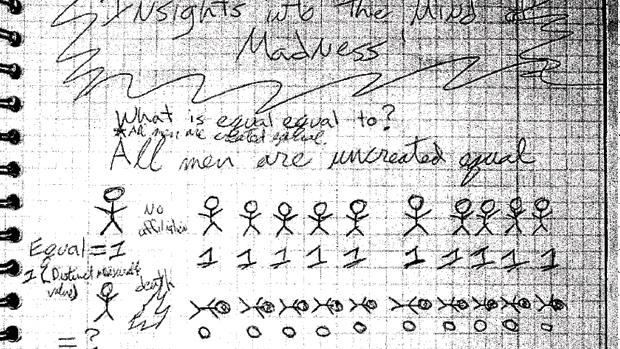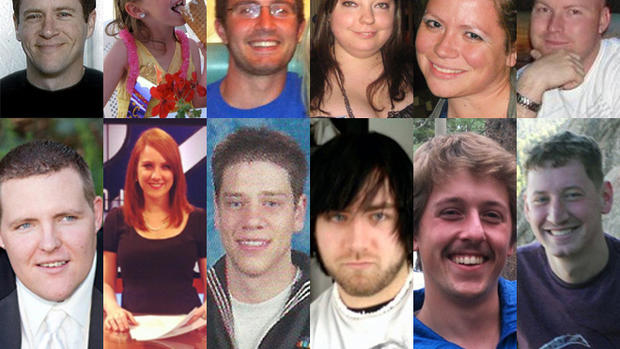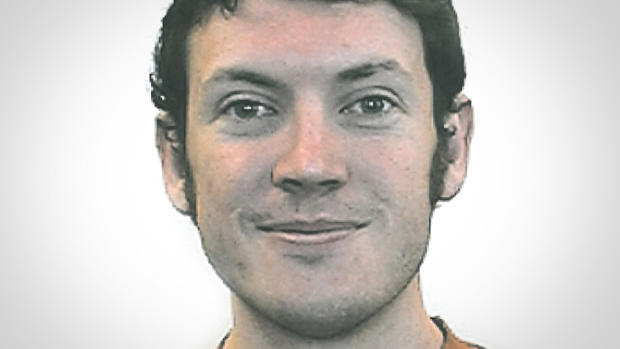Colorado theater shooting jury hears closing arguments
CENTENNIAL, Colo. - James Holmes entered a packed movie theater with overwhelming firepower intent on killing as many people as he could, a prosecutor told jurors Tuesday in closing arguments at the gunman's death penalty trial.
"This guy walked into that theater and tried to murder everyone in it," District Attorney George Brauchler said, pointing at Holmes, who sat impassively at the defense table.
Family members sobbed as he called up pictures and memories of the victims.
In his final appeal to the jury before they begin deliberations, Brauchler again stressed the heavy toll on unsuspecting victims who had gone to see the midnight premier of a Batman movie, "The Dark Knight Rises."
"They came in hoping to see the story of a hero dressed in black, someone who would fight insurmountable odds for justice," Brauchler said. "Instead, a different figure appeared by the screen. ... He came there with one thing in his heart and his mind, and that was mass murder."
Defense attorneys were scheduled to give their closing argument later Tuesday.
Holmes, now 27, does not dispute that he was the lone gunman who attacked the theater but pleaded not guilty by reason of insanity. His attorneys say schizophrenia so warped his mind he could not tell right from wrong.
Brauchler told jurors the evidence shows Holmes knew what he was doing was illegal and that he cannot be considered insane under Colorado law.
Holmes slipped into the packed theater on July 20, 2012 - almost three years ago - and opened fire with a shotgun, an assault rifle and a semiautomatic pistol. Twelve people died and 70 were injured.
Dozens of victims and family members were in the courtroom Tuesday, and some wept as Judge Carlos A Samour Jr. read the names of the dead and wounded while he gave the jury his instructions. Sandy Phillips wore a green scarf that belonged to her daughter, Jessica Ghawi, who was killed.
Holmes' parents, Robert and Arlene Holmes, sat on the opposite side of the courtroom from the victims. Seated with them was Bob Autobee, who spoke out against the death penalty when his son, a prison guard, was killed by an inmate. Autobee shook Robert Holmes' hand and hugged Arlene Holmes.
Closing arguments had been scheduled to start earlier in the day but were delayed after the defense said some of the slides prosecutors planned to show jurors were improper. Brauchler defended the images.
Samour ordered Brauchler to change or delete some of the slides, saying they misstated the evidence or made overbroad allegations. The judge allowed Brauchler to keep other slides, including one that referred to Holmes wearing a "kill suit" during the shootings.
Prosecutors and defense attorneys have two hours each to make their cases. They will try to help jurors make sense of thousands of pieces of evidence and more than 250 witnesses who testified in the 11-week trial. With that information, it will be up to the jury to decide whether prosecutors met their burden of proving Holmes was legally sane.
Two state-appointed forensic psychiatrists who evaluated Holmes determined that he was legally sane, despite severe mental illness. One of the doctors, William Reid, showed jurors nearly 22 hours of sometimes chilling videotaped interviews in which Holmes haltingly describes taking aim at fleeing moviegoers and longing to kill others to increase his own self-worth.
Holmes spent months amassing an arsenal of weapons and body armor. He scrawled detailed plans for the massacre in a spiral notebook, weighing which auditoriums in the Aurora theater complex would allow for maximum carnage.
Holmes also rigged his 800-square-foot apartment into a potentially lethal booby trap that he hoped would divert police and paramedics from the theater as he set about his attack. Holmes hid his plans from everyone, including a university psychiatrist to whom he mailed his notebook just before the attack.
Defense attorneys will present Holmes as a struggling neuroscience student who was on the brink of mental collapse well before he acted on increasingly powerful delusions that told him to kill. They called to the stand mental health professionals who analyzed Holmes and found him suffering an array of illnesses, from schizophrenia to full-blown psychosis.
Because of the conflicting testimony from mental health professionals, CBS News legal analyst Rikki Klieman told CBSN on Tuesday that the closing arguments would come down to a "battle of experts."
Klieman also noted that Holmes' lawyers ended their case with "very powerful" video, showing Holmes throwing himself head-first into a wall and being restrained in a bid to bolster the insanity defense.
The defense's strongest witness was Raquel Gur, a nationally known schizophrenia expert who interviewed Holmes for 28 hours and said his thoughts about killing other people became an uncontrollable storm in his mind in the months before the shooting. She and another psychiatrist declared him legally insane. The shooting would not have happened if not for Holmes' psychosis, Gur said.
The doctors said Holmes had struggled with mental illness since childhood, seeking a career in neuroscience to better understand what he described in his notebook as his "broken mind" and a list of self-diagnoses.
In a few days Aurora will mark the third anniversary of the July 20 shooting. And the jury may well still be deliberating the man who did it.


